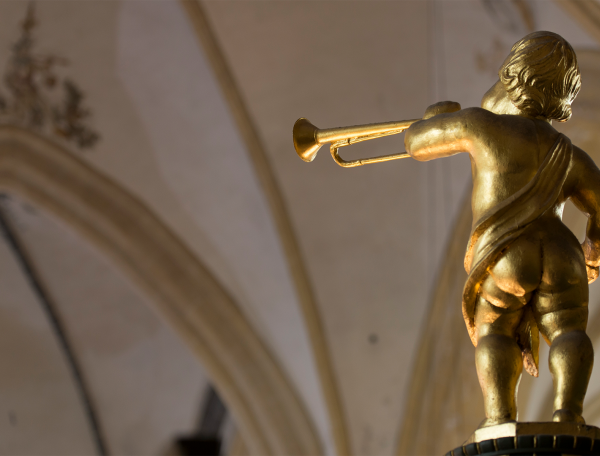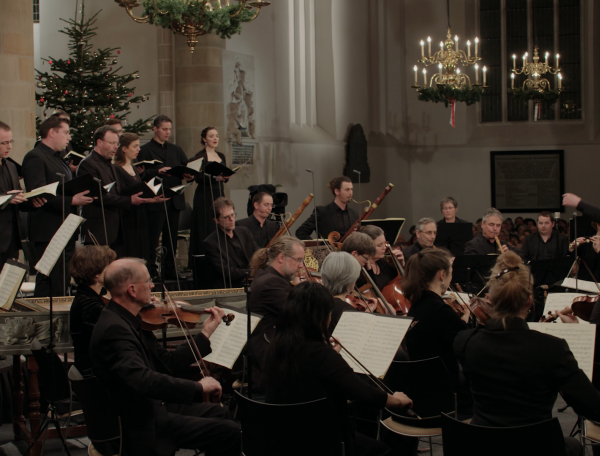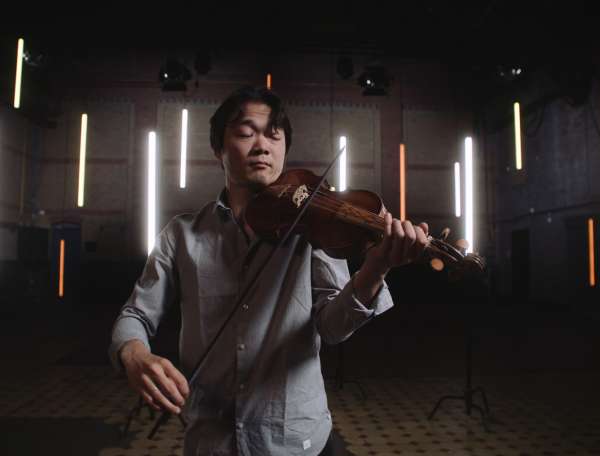

Magnificat
Magnificat performed by the Netherlands Bach Society
conducted by Jos van Veldhoven
Grote Kerk, Naarden
Behind the music
The mighty arm of God
The expressive power of this song of praise about God's justice is overwhelming
The Magnificat is the first large choral work that Bach composed after his appointment in Leipzig in the spring of 1723. It is an ‘old-fashioned’ but delightful five-voiced work that uses Latin, just like the other rarity among Bach’s works, the Mass in B minor. The text comes from the Gospel of Luke, and is about the visit made by Mary to her cousin Elisabeth, who was also pregnant. She welcomed Mary with the words: ‘Blessed art thou among women, and blessed is the fruit of thy womb!’ Mary answered, saying: ‘My soul doth magnify the Lord (Magnificat anima mea Dominum), and my spirit hath rejoiced in God my saviour, for he hath regarded the low estate of his handmaiden’. The religious feast day associated with this event, the Feast of the Visitation, was held in Bach’s day on 2 July, although nowadays it is celebrated on 31 May. Bach may have planned the Magnificat to have been sung at this first important religious feast day after his appointment. But as his aim of composing a new cantata for each Sunday turned out to be rather a high one, he might have postponed the completion of the Magnificat until the next feast day, Christmas 1723. In any case, that was when it was first performed, supplemented by a few suitable hymns in German.
Bach revised his Magnificat ten years later. He replaced the recorders with transverse flutes, transposed the work to a different key, gave the solo trumpet passage in the tenth part to two oboes playing in unison, and left out the songs related to Christmas, which made the piece suitable for other occasions as well.
The Magnificat has twelve parts, each lasting no more than three minutes. But the expressive power of this song of praise about God’s justice is overwhelming. He lets rulers bite the dust while the humble are raised up, and he feeds the hungry while sending away the rich. The text is given warm colour by using brass for the martial sounds and woodwind for the more loving passages, alongside strings and basso continuo. The full ensemble plays only at the beginning, in the central section and at the end. In the intervening parts, different vocal and instrumental combinations alternate, in order to support the text as expressively as possible.
Bach also uses expressiveness down to the last detail; for example in the second part with dancy sounds to the word ‘exultavit’, in the fourth part by suddenly using almost the whole ensemble for the words ‘omnes generationes’ and in the sixth part through the triplets for the word ‘timentibus’. In part 7, Bach applies this same principle to the maximum, with a furious, six-voiced fugue to the text ‘fecit potentiam in brachio suo’, to illustrate with conviction how far the mighty arm of God extends.
- BWV
- 243
- Title
- Magnificat in D major
- Genre
- Latin church music
- Year
- 1723 / 1733
- City
- Leipzig
- Lyricist
- Mary's Song of Praise, Luke 1: 46-55
- Occasion
- Christmas Day / Feast of the Visitation
- First performance
- 25 December 1723 / 2 July 1733
- Special notes
- There are two versions, the first of which (in E flat major) is less common.
Extra videos
Conductor Jos van Veldhoven
“Jos van Veldhoven guides us through one of Bach's most beautiful manuscripts.”
Lucia Swarts and Richte van der Meer
“Cellists Lucia Swarts and Richte van der Meer about their fundamental role in 'Quia Fecit'.”
Tenor Thomas Hobbs
“What is it like for a soloist to sing the choir parts as well as the arias? Tenor Thomas Hobbs explains.”
Vocal texts
Original
1. Coro
Magnificat anima mea Dominum
2. Aria (soprano)
Et exsultavit spiritus meus in Deo
salutari meo.
3. Aria (soprano), coro
Quia respexit humilitatem
ancillae suae:
ecce enim ex hoc beatam me dicent omnes generationes.
4. Aria (basso)
Quia fecit mihi magna qui potens est
et sanctum nomen ejius.
5. Duetto (alto, tenore)
Et misericordia ejus a progenie in progenies timentibus eum.
6. Coro
Fecit potentiam in brachio suo
dispersit superbos
mente cordis sui.
7. Aria (tenore)
Deposuit potentes de sede
et exaltavit humiles.
8. Aria (alto)
Esurientes implevit
bonis et divites
dimisit inanes.
9. Terzetto (soprani, alto)
Suscepit Israel puerum
suum recordatus
misericordiae suae.
10. Coro
Sicut locutus est ad patres nostros,
Abraham et semini ejus
in saecula.
11. Coro
Gloria Patri et Filio et Spiritui Sancto.
Sicut erat in principio, et nunc, et semper, et in saecula saeculorum.
Amen.
Translation
1. Chorus
My soul magnifies the Lord.
2. Aria
And my spirit rejoices in God
my Savior.
3. Aria, Chorus
For He has regarded the lowliness
of His handmaiden.
Behold, from henceforth, I will be called blessed
by all generations.
4. Aria
For the Mighty One has done
great things for me, and holy is His name.
5. Duet
His mercy is for those who fear Him
from generation to generation.
6. Chorus
He has shown strength with His arm,
He has scattered the proud in the thoughts of their hearts.
7. Aria
He has brought down the powerful from their thrones and lifted up the lowly.
8. Aria
He has filled the hungry
with good things,
and sent the rich away empty.
9. Trio
He has helped His servant Israel
in remembrance
of His mercy.
10. Chorus
According to the promise He made to our ancestors,
to Abraham and to His descendants
forever
11. Chorus
Glory to the Father and to the Son and to
the Holy Spirit, as it was in the beginning,
is now, and for ever and ever,
Amen.
translation ©Pamela Dellal
Credits
-
- Release date
- 12 September 2014
-
- Recording date
- 2 May 2014
-
- Location
- Grote Kerk, Naarden
-
- Conductor
- Jos van Veldhoven
-
- Soprano 1
- Julia Doyle
-
- Soprano 2
- Hana Blažíková
-
- Alto
- Maarten Engeltjes
-
- Tenor
- Thomas Hobbs
-
- Bass
- Christian Immler
-
- Ripieno soprano
- Lauren Armishaw, Griet de Geyter, Marjon Strijk, Kristen Witmer
-
- Ripieno alto
- Leandro Marziotte, Elena Pozhidaeva
-
- Ripieno tenor
- Kevin Skelton, Immo Schröder
-
- Ripieno bass
- Jelle Draijer, Sebastian Myrus
-
- Violin 1
- Shunske Sato, Paulien Kostense, Anneke van Haaften
-
- Violin 2
- Hanneke Wierenga, Annabelle Ferdinand, Annelies van der Vegt
-
- Viola
- Deirdre Dowling, Esther van der Eijk
-
- Cello
- Lucia Swarts, Richte van der Meer
-
- Double bass
- Robert Franenberg
-
- Traverso
- Marten Root, Doretthe Janssens
-
- Oboe
- Martin Stadler, Peter Frankenberg
-
- Bassoon
- Benny Aghassi
-
- Trumpet
- Robert Vanryne, Neil Brough, Mark Geelen
-
- Timpani
- Peppie Wiersma
-
- Harpsichord
- Siebe Henstra
-
- Positive organ
- Pieter-Jan Belder
-
- Concert production
- Imke Deters, Marco Meijdam
-
- Producers
- Zoë de Wilde, Frank van der Weij
-
- Film director
- Lucas van Woerkum
-
- Director of photography
- Sal Kroonenberg
-
- Camera
- Sal Kroonenberg, Robert Berger, Benjamin Sparschuh, Lonneke Worm
-
- Film editors
- Lucas van Woerkum, Frank van der Weij
-
- Music recording producer
- Leo de Klerk
-
- Gaffer
- Victor Jas
-
- Best boy
- Ravi Piccolo
-
- Production assistant
- Joggem Simons
-
- Score reader
- Eva Mulder
-
- Make up
- Jamila el Bouch, Marloes de Jong, Hanneke de Hertog, Marjolein Vossenbeld
-
- Music recording assistants
- Jaap Firet, Gilius Kreiken, Jaap van Stenis
-
- Camera assistants
- Izak de Dreu, Indy Hamid
-
- Music edit and mix
- Leo de Klerk, Frank van der Weij
-
- Music edit assistant
- Martijn Snoeren
-
- Colorist
- Jef Grosfeld
-
- Interviews
- Onno van Ameijde
-
- Acknowledgements
- Angela Mast, Marlo Reeders
Discover
Help us to complete All of Bach
There are still many recordings to be made before the whole of Bach’s oeuvre is online. And we can’t complete the task without the financial support of our patrons. Please help us to complete the musical heritage of Bach, by supporting us with a donation!

